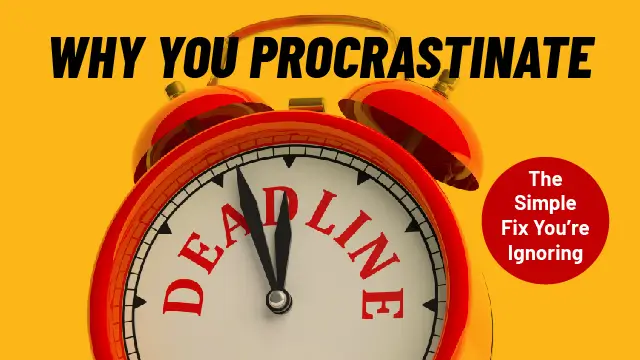Why You Procrastinate? (And the Simple Fix You’re Ignoring)
Did you know that 80% of adults consider themselves chronic procrastinators? That means 4 in five people regularly delay important tasks, often at the cost of their productivity and peace of mind. Procrastination isn’t just about putting things off—it’s a habit that can sneak into every corner of your life, from work to personal goals. If you’re tired of that cycle of guilt and stress, let’s break it down and find a simple fix.

The Problem: Procrastination Isn’t Laziness
Procrastination is often misunderstood. It’s not about being lazy or unmotivated; it’s about avoiding discomfort. Whether it’s fear of failure, perfectionism, or even boredom, procrastination is your brain’s way of dodging a challenge.
The Problem: Procrastination Isn’t Laziness Procrastination is often misunderstood. It’s not about being lazy or unmotivated; it’s about avoiding discomfort. Whether it’s fear of failure, perfectionism, or even boredom, procrastination is your brain’s way of dodging a challenge.
Why Procrastination Hurts More Than You Think?
The cost of procrastination goes beyond missed deadlines. It leaves you feeling anxious, guilty, and stuck in a cycle of self-doubt.
Think about the last time you put something off. Did you feel relief? Probably not. Instead, you likely felt a low hum of stress in the back of your mind, knowing the task was still waiting for you. This stress can snowball, leading to poor performance, damaged relationships, or even long-term burnout.
Here’s another eye-opener: a study found that procrastination is directly linked to higher stress levels and poorer health outcomes. The more you procrastinate, the more you’re likely to feel overwhelmed—not just mentally, but physically too.
The Solution: Simple Fixes to Overcome Procrastination
1. Understand the Root Cause
Why do you procrastinate? Start by identifying your triggers. Is it fear of failure, perfectionism, or just not knowing where to start? Understanding the “why” behind your behavior is the first step toward change.
Quick Tip: Keep a journal for a week and note when and why you procrastinate. Patterns will start to emerge, and those insights are powerful.
2. Break Tasks Into Smaller Steps
Big tasks can feel overwhelming, so shrink them into manageable chunks. For example, if you’re dreading writing a report, start by jotting down the title or outlining the main points.
Try This: Use the “2-Minute Rule.” Commit to working on a task for just two minutes. Most of the time, getting started is the hardest part, and once you do, you’ll likely keep going.
3. Use Time Management Techniques
One of the best ways to stay on track is to manage your time effectively. The Pomodoro Technique, which involves working for 25 minutes and then taking a 5-minute break, is a great place to start.
Bonus Tip: Time-block your day. Allocate specific periods for specific tasks. Knowing you’ve set aside time reduces the pressure to do everything at once.
4. Create Accountability
Telling someone your goals makes you more likely to follow through. Share your plans with a friend, family member, or even a coworker who can check in on your progress.
Tech Tip: Try apps like Habitica or Focusmate that gamify productivity or pair you with an accountability buddy.
5. Celebrate Small Wins
Finally, don’t forget to reward yourself for progress. Finished a task? Take a break, grab a snack, or watch an episode of your favorite show. Positive reinforcement keeps you motivated and helps rewire your brain to enjoy productivity.
Conclusion: Don’t Wait to Take Control
Procrastination may feel like a small habit, but its ripple effects can create big problems. The good news? You don’t have to overhaul your life to beat it.
Start small: figure out why you procrastinate, tackle tasks in bite-sized steps, and celebrate every win along the way.
So, what’s one task you’ve been avoiding? Don’t wait—start now, even if it’s just for two minutes. Your future self will thank you.
Hi, I'm Chelsea Parker, a globetrotter, storyteller, and life enthusiast with a knack for turning everyday experiences into unforgettable lessons. From surviving $20-a-day adventures in Southeast Asia to mastering mindfulness in my daily routine, I share relatable and entertaining tales that inspire you all to explore, grow, and thrive. When i'm not writing, you may find me chasing sunsets, savoring street food, or dreaming up my next big adventure.





